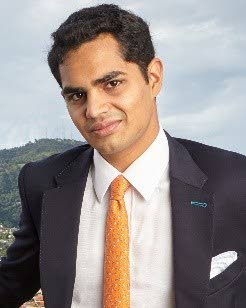Face risks with eyes wide open

KIRAN MATHUR MOHAMMED
kmmpub@gmail.com
Pearl is close to despairing, but holds it together. She clutches her crying child, wading through mosquito-infested floodwater in the galvanised iron house that she’s kept intact: mostly through strength of will. She manages to hand the baby over to her aunt, and grabs her hat as she goes off to work as a security guard.
There isn’t much security in her own life. Later, exhausted and having just received a call from the aggressive father of her child, she nods off at work, only to be upbraided by her supervisor. Trudging home, she breathes in the smell of rain on the hot pavement, and closes her eyes for a moment.
Lives are slowly being ground down. Growth is the only thing that can help. And growth is not easy. Getting energy companies to pay more tax and sell more gas to the downstream chemical plants; negotiating the Dragon field with a chaotic Venezuela, and turning around Petrotrin are necessary. Incentivising energy companies to invest in future production, and ensuring Petrotrin’s workers have a safety net are also necessary.
A small group of leaders, mandarins, politicians and executives must untangle and solve these problems. It is easy to criticise them. I’ve stared at the national budget at three in the morning with a group of men and women on the eighth floor of the finance building. Whatever else may be said – they work hard.
But what positive, specific recommendations can we make, or actions can we take? What can businesses and entrepreneurs do?
Any policy recommendations must be either cheap or close to revenue neutral. It is difficult to know what works; new projects could lead to disaster. I left a risk-averse world of finance to start new businesses, and, in my 20s, I am now experiencing a good share of terror.
But policy doesn’t have to involve that. Finance faces risks with eyes wide open – and manages them. Why not marry that with Silicon Valley’s approach: run controlled trials, and pilot different projects? Then we can know what works and what doesn’t. This can be done relatively cheaply.
Next, we can simply copy from more advanced companies and countries. Naipaul called us the “mimic men.” We can embrace that and free-ride off others’ investments and technologies. If it works somewhere else, and we don’t have it, then start the business.
What, then, are our comparative advantages, and what do we have in excess?
If we have a glut of doctors and lawyers, can we push healthcare tourism or retrain lawyers to have British legal work outsourced here? We are close to the US and are English speaking – not advantages to be sniffed at. We have absurdly cheap electricity: why not set up data centres?
I aim to explore some of these ideas in this series, and speak to people who could make them real or expose their flaws. I also want to understand the narrative of our economy: people’s fears, problems, hopes and ideas.
We still have the powerful resource of our young people; and our diaspora. Every month I meet some of them through the World Economic Forum’s Global Shapers programme. Despite how tired I am sometimes when I arrive, I always leave fired-up by their optimism and actions: fighting for better mental health or to support refugees.
Even that resource though, is being depleted. Educated millennials are emigrating at one of the highest rates in the world… tabanca music at leaving parties. They are unable to find jobs where they can be truly productive, or find meaning. Many today don’t see a path.
Then there are the thousands whose horizons are narrowed. They can barely afford to think of the next month, far less the next year.
Economist Albert O Hirschman modelled social change in Exit, Voice and Loyalty. Social discontent is expressed through people leaving (exit), protesting and raising their voice or remaining loyal to retain whatever advantages they still have.
In TT people have mainly left or stayed “loyal.” For those who have remained, loyalty is not derived from satisfaction with the existing system, but a rationalisation that raising their voice or making direct changes will not improve their lives.
Those of us who can must give a voice to those who have none, or have lost theirs: and build structures of opportunity.
Despite simmering frustration, there is a strain of hope that remains for those of us who stay. The beauty and abandon of the place. The smell of rain on hot pavement is difficult to forget.
Kiran Mathur Mohammed is a social entrepreneur, economist and businessman. He is a former banker, and a graduate of the University of Edinburgh.


Comments
"Face risks with eyes wide open"